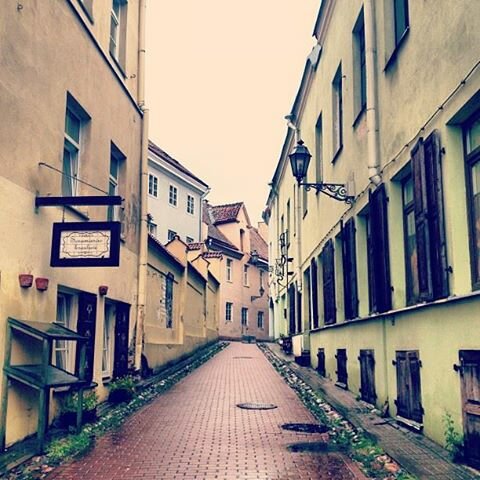“Excuse me,” I say in Lithuanian, feeling the waitress’ grin at my American accent, “Do you have any hot sauce?”
She looks at me puzzled, as if I had ordered something so exotic, so ridiculous and so foreign that I had, literally, blown her mind. She tells me to wait a second and leaves the table; I wait in suspense…
Minutes later the waitress comes back to the table with a tub of sour cream; she ensures me it will suit me better than any kind of hot sauce, hot sauce that would never be available in the country in the first place…
I’ve spent the last month in Lithuania, a little, little known country north of Poland and on the Baltic Sea (It’s one of the three Baltic countries, the other two are Latvia and Estonia), otherwise known as the motherland to me. My father was born here in 1942 and fled the country to escape Soviet rule while my mother’s parents, also Lithuanian, fled the same time.
In my time in the motherland, I have been working as a tour guide in the Museum of Genocide Victims in Lithuania’s capital Vilnius, a museum that was former NKVD and KGB prison, learning a great deal about the Soviet occupation of Lithuania, how exactly my own relatives were tortured in the building I now work in and a great deal about myself in the process.
The knowledge I’ve accumulated over the month has ranged from the most trivial of matters (Such as that the aforementioned hot sauce, or any spicy food, does not exist in such an Eastern European territory) to more serious issues, issues that shake the very foundation in which we Americans grow up admiring.
While sour cream may be the popular favorite to win any food contest over here (Mix that with bacon grease and mushrooms and you’ve got yourself a winner every time), struggles in this country run deeper than food.
The population that boasted proudly of having 3 million people 10 years ago is declining, as the youth of the country moves out in search of opportunity, assuming opportunity does not exist in Lithuania. American values and attitudes bleed with the thought that a man can make himself, that any person can make any opportunity for him or herself. Things in Lithuania are a bit different.
 Only 22 years old as an independent country, Lithuania has a rich history that extends over one thousand years. Within those thousand years, the country has been occupied by a cornucopia of countries, ranging from Poland to Russia to Germany, and has somehow maintained a cultural identity and pride that could put any jingoistic, nationalistic, fascist flag-waving fuck to shame.
Only 22 years old as an independent country, Lithuania has a rich history that extends over one thousand years. Within those thousand years, the country has been occupied by a cornucopia of countries, ranging from Poland to Russia to Germany, and has somehow maintained a cultural identity and pride that could put any jingoistic, nationalistic, fascist flag-waving fuck to shame.
That being said, years of occupation have instilled an attitude of impossibility in the country, an attitude that, while strong and proud, assumes that a better life is not possible, that progress in society is nonexistent and foolish to dream of.
As an American-Lithuanian, it is not irregular for citizens here to look down on me and my family for abandoning the country during WWII and the Soviet occupation. Working in a museum that used to house anybody who might have opposed Soviet ideology, I’ve learned of the struggles that people, not only in Lithuania, but throughout the entire USSR had to endure. I know the torture methods, I know how innocent people had to stand on platforms above a pool of ice cold water for days and nights on end, praying to stay awake while being interrogated as to not pass out and fall into the freezing liquid, or in winter, onto the bloodied, concrete ice. I know the execution process, step by step, and how there are still mass graves for those executed that are still undiscovered.
Lithuania, as I imagine the majority of Eastern Europe, is bitter. How could one who dealt with such oppression not be? But I’m not here to argue over what oppression of which people is worse, because in my eyes, any oppression and ethnic cleansing of a people is unforgivable. I’m really not here to argue anything, just to express some observations of the world.
In my experience, the majority of people in the United States assume that it is the greatest country on the earth and that living elsewhere would be a travesty. It is assumed that, because of our national values and the “American Dream,” quality of life in the States is automatically and infinitely greater than in other countries. I am proud to be an American, but after a month living in Lithuania, an Eastern European country that is only, technically, 22 years old, I’m not quite certain America is the best place to be in the world.
 To put things in a financial perspective, one of my friends that moved from the States to Lithuania explained to me that a person could live more than comfortably on 2,000 Litas (the national currency here) a month, including dining out and partying on the weekends, for you college folk. To put that into an American financial perspective, that’s a little less than $800 a month, meaning less than $10,000 a year. In our country of oversaturated universities and millionaire dreams, $10,000 a year for one person is officially considered under the poverty line that may be too low anyway. So, financially put, is America’s quality of life really that much better?
To put things in a financial perspective, one of my friends that moved from the States to Lithuania explained to me that a person could live more than comfortably on 2,000 Litas (the national currency here) a month, including dining out and partying on the weekends, for you college folk. To put that into an American financial perspective, that’s a little less than $800 a month, meaning less than $10,000 a year. In our country of oversaturated universities and millionaire dreams, $10,000 a year for one person is officially considered under the poverty line that may be too low anyway. So, financially put, is America’s quality of life really that much better?
Anybody who has a full-time job in Lithuania automatically receives full health insurance, while people who have part-time jobs may pay 70 Litas a month to receive equal benefits. Are socialist ideas really that bad? Plenty of people in the States who work more than a full-time job don’t have the ability to afford health insurance.
I guess my final question is this: as a college student or person of the same age, should you really limit yourself to one region of the world because you were brought up to believe it was the best there ever was? We fret over employment rates in the States while opportunities to better the rest of the human race are open for the taking across the globe. With our American mindset that we can make our lives better than ever imagined, who’s to say our lives need to be set in America? Why not use those American values to stimulate the economy of a country that lost out on 50 years of independence? Even broader, why not explore the world to see what culture fits with your mindset to raise your quality of life, rather than struggle in a system in which your individual beliefs doom you to societal failure?
Since I’ve been in 6th grade, I’ve put hot sauce on almost every single food I’ve eaten, but is that the only thing that’s going to keep me from living in a place where I can love and be happy?
And if it’s really that important to me, wouldn’t I just establish the hot sauce market here, anyway?





